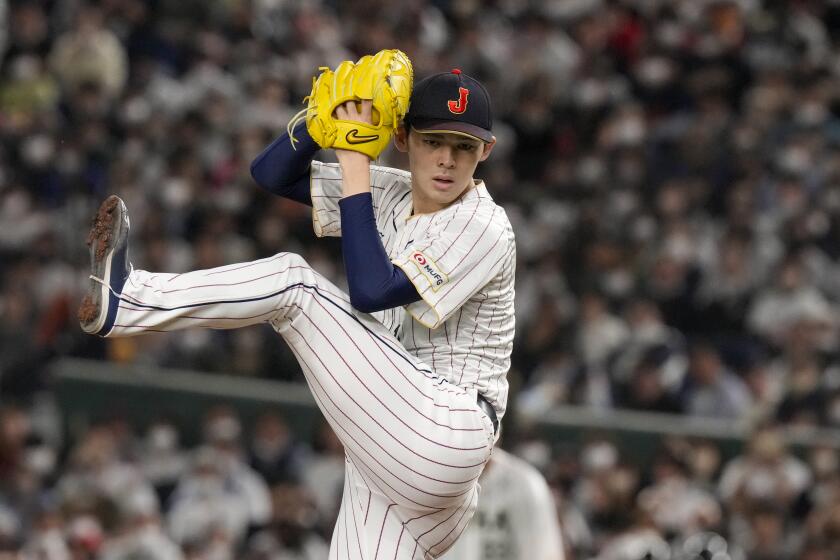Angels’ Fortunes Will Determine Cookie’s Future
- Share via
Our two major league baseball managers in this general vicinity go by the handles Tommy and Cookie. Sometimes I feel as though we have all just joined the Mousekateers.
Each of these gentlemen, Mr. Lasorda and Senor Rojas, have the jobs they have because of extenuating circumstances, or at least you could look at it that way.
No matter what Lasorda said the other day about not yet being tired of managing, there is a very good chance that he could have become the Dodgers’ general manager by now. When Al Campanis got toppled on Ted Koppel, a new season had just begun, and it would have been a strange time to change managers.
Fred Claire could have been considered a fill-in. A stopgap measure. The Dodgers might have given him permission to steer the ship for just one season, then made an understandable maneuver to promote Lasorda to GM and bring in somebody else to manage--Bobby Valentine, maybe, or Bill Russell, if they thought he was ready for it, or even Kevin Kennedy, from the farm system.
For whatever reason, however, Claire kept the job. He was given carte blanche, or so it certainly seemed, to shop and swap during the off-season, and thus--after some preliminary accusations that Claire was reluctant to act--the Dodgers latched onto Kirk Gibson, Mike Davis, Alfredo Griffin, Jesse Orosco, Jay Howell, Don Sutton and Rick Dempsey, the new blue crew.
Since Lasorda’s contract extension as manager already has gotten enough attention, let us turn our eyes from Los Angeles, the City of Angels, to Anaheim, the City of . . . uh, Angels. (Could “Anaheim” be Spanish for “City of Dodgers?”)
Cookie Rojas is the manager here only because Gene Mauch made everybody think he was coming back. When Mauch took his leave of absence, the Angels needed only an interim manager, because it was almost as if the guy who ran the store was simply on vacation.
Rojas was put in charge temporarily. Not only did the Angels not go searching, they didn’t even bother weighing the qualifications of some of their coaches, Bobby Knoop and Marcel Lachemann and Moose Stubing, for instance.
Even General Manager Mike Port acknowledged later that, had Mauch announced his permanent retirement in December or January rather than mere days before the season opener, the Angels definitely would have gone shopping. The Angel manager might be somebody such as Dallas Green or Pat Corrales or Frank Robinson, somebody who was available at the time.
Port might even have given a buzz to Lasorda’s home in Fullerton. Tommy’s contract was nearing an end, remember. He was coming off two fifth-place finishes, too. You never know. For the right money at the right moment, Lasorda might have left Fernando and Pedro for Wally and Chili.
Oh, well. Past is past.
Let us look today, at the All-Star break, at how the Angels have done in the Rojas regime.
The Dodgers have received the lion’s share of our attention, obviously, by virtue of having spent most of the season in first place. The Angels, on the other hand, have spent most of the season dodging last place, and thanking the Lord for creating Seattle.
Are the Angels any good?
Well, for some reason, they evidently think so. I suppose it is nice that a club that spent more than a month in last place in baseball’s worst division should go into the All-Star break with some sort of goofy optimism.
That’s what winning five straight games will do for you. That’s what winning seven of your last eight games--all on the road--will do for you.
When this most recent road swing began, the Angels went right out and lost a pair at Detroit by the combined score of 17-1. Ugh.
We were beginning to wonder if Rojas would last the year. No matter how short a time he had been on the job, the Angels were playing terrible baseball, and, well, that’s the way a Rojas crumbles.
Sure, every man deserves a fair shake, but it wasn’t as though the Angels were decimated with injuries. Most of the key players--Wally Joyner, Mike Witt, Johnny Ray, Chili Davis--were healthy. Devon White went down, and that hurt, and later Dan Petry was out. All in all, though, the Halos were whole.
By mid-June, though, they were 16 games under .500.
While I couldn’t understand a lot of this team’s moves, I thought it best to keep my fat trap shut for a while and see what happened. I couldn’t understand putting an All-Star second baseman in left field, couldn’t understand leaving Bryan Harvey behind when camp broke, and certainly couldn’t understand giving up on Bill Buckner.
With Ray in left and Davis in right, the Angels were in danger of having the worst defensive outfield in baseball. After White went out, the Angels found themselves using people such as Chico Walker in center field, and every ball hit beyond the infield dirt became an adventure. In the infield, the Angels are set. From third to first, particularly with Ray playing second base, this infield stacks up with anybody’s, and even Mark McLemore hit better than expected when he was in there. Joyner, for some reason, has had a power outage, but otherwise remains a top-shelf player.
Catcher Bob Boone refuses to act his age, which keeps the considerably younger Darrell Miller on the bench. If the Angels do not make a run at the top of the division, they would be wise to go to Miller more and more, thereby preparing him for the future.
The pitching staff is where the Angels have gone wrong. Witt, Petry, Chuck Finley, Willie Fraser and DeWayne Buice all have losing records. Good thing Kirk McCaskill is back on track. Better thing Bryan Harvey came along. We may be talking American League rookie of the year here.
Is this season already over for the Angels? They think not. They once were 19 1/2 games back of the Oakland Athletics, but now they are 12 1/2 back. Maybe they can keep chipping away.
I doubt if it’s necessary to extend Cookie’s contract at this point, but the least we can do is see what the Angels do next: Fly or die.
More to Read
Are you a true-blue fan?
Get our Dodgers Dugout newsletter for insights, news and much more.
You may occasionally receive promotional content from the Los Angeles Times.










